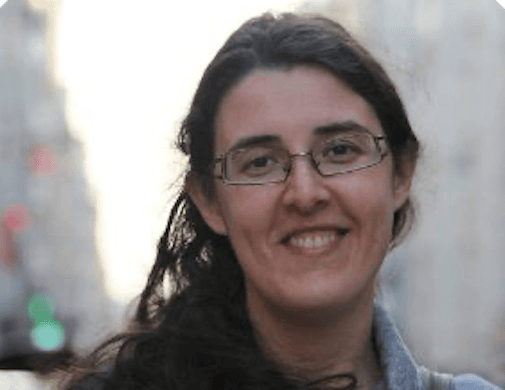Israeli-Russian Scholar Being Held by Pro-Iran Faction Is Alive, Israel Reports
The government in Jerusalem says it will hold Iraq responsible for the scholar’s safety.

Since March, when a Princeton doctoral candidate, Elizabeth Tsurkov, was kidnapped at Baghdad by members of an Iranian-backed Iraqi militia, officials involved in efforts to release her have been mum. On Wednesday, Jerusalem publicized details of a case involving a passionate, complex, brave, and somewhat reckless woman.
A dual Russian-Israeli citizen, Ms. Tsurkov is alive and being held by a pro-Iran militia, Kataib Hezbollah, according to the Israeli prime minister office’s statement. Israel, it added, considers the Iraqi government responsible for her well being. Ms. Tsurkov, on her own initiative, entered Iraq with a Russian passport to research her Ph.D. thesis. Israel is doing all it can to secure her release, the statement said.
Some Iraqi press accounts claims that the 37-year-old Ms. Tsurkov is an Israeli spy, something that is highly unlikely. A longtime critic of Israel’s policies, she has made passionate pleas on Twitter, in articles, and in interviews on behalf of various Mideast anti-regime groups, dissidents, and those who fight extreme Islamists like ISIS.
An unidentified senior Israeli official told the Y-net website that Jerusalem is doing all it can to release Ms. Tsurkov and, since her kidnapping, has been in contact with her family. He noted that her trip to Iraq is a violation of an Israeli law banning citizens from visiting enemy states like Lebanon, Syria, and Iraq. “The law also forbids Israeli citizens to enter those states with a foreign passport,” he added.
While Israel may pull a lot of global strings in the case, it has little leverage over an Iraqi militia that is widely controlled by Iran’s Islamic Revolutionary Guards Corps. America may have ties with the Baghdad government, but it lists Kataib Hezbollah, which attacks GIs in Iraq, as a terrorist organization.
President Putin, though, is said to be involved in the case, and Russia’s close ties to Tehran may help.
Ms. Tsurkov’s well-known online persona, and her tendency to at times disclose personal details, may have helped the kidnappers locate her. In a March 18 tweet to her 79,500 followers, she detailed an incident in which she had herniated “three discs,” adding, “Had an operation a few days ago and I’m doing much better now.”
Ms. Tsurkov was reportedly abducted a few days after that tweet. Her kidnappers may have learned her whereabouts from hospital records. Her Twitter handle, @elizrael, may have identified her national identity.
According to various sources who spoke to the Sun, Ms. Tsurkov has rented an apartment at the heart of Baghdad in order to complete her research into Iraqi militias, focusing on the Shiite Sadr movement, which competes with Kataib Hezbollah on influence over Iraq’s Shiites. Thus, the motivation for the abduction may have been connected to her Sadrist sympathies, rather than her nationality.
“Elizabeth is a valued member of the Princeton University community,” the Ivy League institution wrote in a statement. “We are deeply concerned for her safety and well being, and we are eager for her to be able to rejoin her family and resume her studies.”
In 2021 a former hostage in Iran, Xiyue Wang, sued Princeton in a New Jersey court for allegedly encouraging him to ignore dangers in Iran, where he went to research his Ph.D.
“Princeton’s carefully worded statement neither mentions whether the university had any role in making it possible for Elizabeth to do research in Iraq, nor does it say what the university has done to get her out” Mr. Wang now tells the Sun.
“The fact that another Princeton student got detained in fieldwork by pro-Iran forces in the region just a few years after the last incident calls into serious question about Princeton’s internal processes and accountability,” he adds.
That she has been an outspoken critic of Israel, Russia, and Iran complicates things, so she deserves “America’s every effort to bring her to safety,” a Washington-based publication Ms. Tsurkov is affiliated with, New Line magazine, writes in an editorial.
Born at Saint Petersburg, Russia, Ms. Tsurkov moved to Israel at the age of 4 along with her parents, who were dissidents who had been exiled to Siberia at one point. Living at a West Bank settlement, the family was steeped in right-wing ideology. Following service in the army, she worked with a former Russian dissident turned Israeli politician, Natan Sharansky.
Learning Arabic at Tel Aviv University, Ms. Tsurkov became a strong critic of Israel’s policies. Soon she added to Palestinian advocacy some groups opposing President Assad and pleaded on behalf of oppressed Mideast minorities. Favoring granular research based on on-the-ground interviews, she started traveling to Mideast countries where Israelis are unwelcome.
When asked if she were risking too much by going there, Ms Tsurkov said, according to a source, “Nah. I travel with my Russian passport and wear a big cross. They all think I’m a Russian Christian.”
Ms. Tsurkov once told an Israeli publication that she opposes government efforts to release citizens captured in enemy states “even if that gets me in trouble in Syria or Iraq.” Now Israel, Russia, America, and perhaps even Italy are working to release her.

